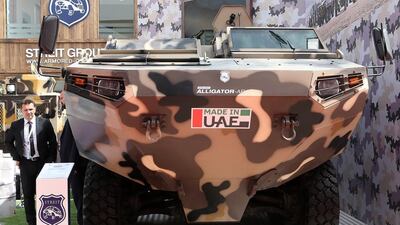Long-standing efforts to promote the GCC’s indigenous defence industrial base are bearing fruit. Our analysis of the deals announced at this year’s International Defence Exhibition & Conference (Idex) in Abu Dhabi shows that over 60 per cent went to UAE-based companies. In terms of the value of these deals, the UAE-based companies grabbed more than 50 per cent of the value, a total of Dh10 billion.
As importantly, 2017 confirms the trend that began in 2016 when a majority of deals also went to locally-based companies. There are similar developments in Saudi Arabia, where Saudi Vision 2030 (the government’s reform programme) aims to “localise over 50 per cent of military spending.”
The challenge for the GCC has been that while it has spent generously on defence in recent decades, it produces less locally than countries with smaller defence budgets. The GCC countries spend more on defence than France, Italy, and the UK combined – more than US$130 billion annually. However, compared to these countries there are comparatively few local defence manufacturing capabilities and industry in the GCC. Indeed, many countries manage to spend less on defence but still have indigenous capabilities. Italy, South Korea, and Turkey have managed to build defence exporters such as Leonardo (formerly Finmeccanica), Hanwha Techwin, and Turkish Aerospace Industries respectively.
Part of the problem is that the GCC states have been inefficient buyers. They have not pooled their procurement. They have weakened their buying power and the potential for local industrial development. Yet the combined GCC militaries have the scale and financial resources to command better prices and investment in local production from the international defence industry than they have in the past. For example, GCC countries buy too many variants of the same platform to perform the same missions. This means higher unit costs than strictly necessary and challenges with interoperability. The six GCC states, all members of its regional defence pact known as Peninsula Shield, use 9,000 armoured personal carriers (and armoured fighting vehicles), one of the largest concentrations in the world. However, between the six countries there are 16 models sourced from 12 countries. Similarly, the GCC countries have more than 800 helicopters consisting of 32 models sourced from six countries.
What has changed in recent years is that GCC military buyers are now asking for more from their suppliers so that they procure and deepen the local defence industrial base at the same time. GCC states are now telling their equipment providers to invest in the GCC, shoulder more of the risk and deliver output-based solutions. Governments in the region no longer negotiate solely on upfront price. Instead they look at through-life costs of acquisition, how much a system will cost now and in the future including repair and maintenance.
This new approach was also on show the week before Idex 2017, at the Abu Dhabi International Offset Conference 2017. Government speakers consistently stressed increased participation and collaboration with defence companies. GCC governments want to build the capabilities of their defence companies to be able to partner with foreign suppliers on everything from services to manufacturing.
These are important steps, but to succeed the GCC states need to procure and localise in three phases to build their indigenous defence industrial capabilities. First they can import technology and manpower to localise support services and locally-based supply chains. Second, they can strengthen these service and supply chains by developing sufficient expertise to modify equipment and, more importantly, to assemble and manufacture it. Third, based on such maintenance, repair and manufacturing capabilities they will be able to develop a regional R&D base. This will allow the GCC states to design and produce their own military equipment, some for regional-specific missions and some that can be exported.
By insisting on more local production and building local defence industrial capabilities, the GCC’s defence industry can change from mostly being a consumer to also being a producer. Defence products and services will be bought by the GCC but also “made in the GCC”.
Haroon Sheikh is a partner with Strategy& (formerly Booz & Co).
business@thenational.ae
Follow The National's Business section on Twitter

